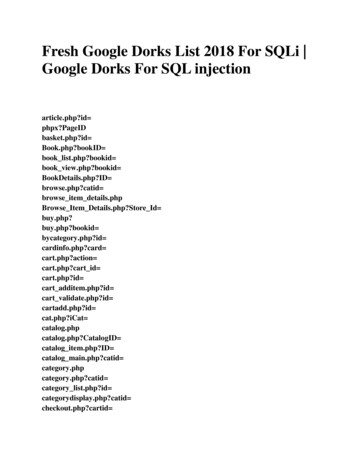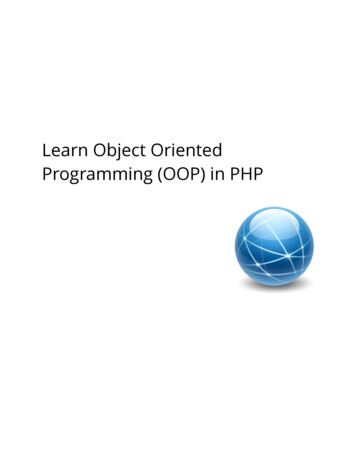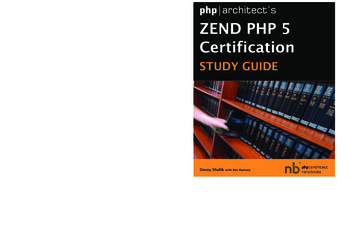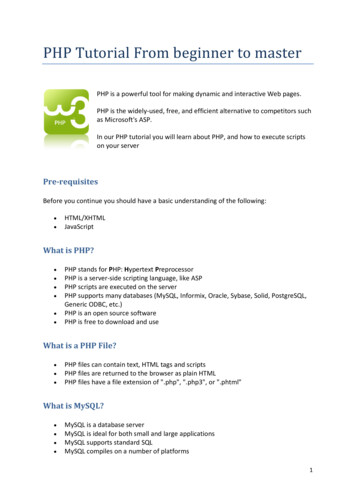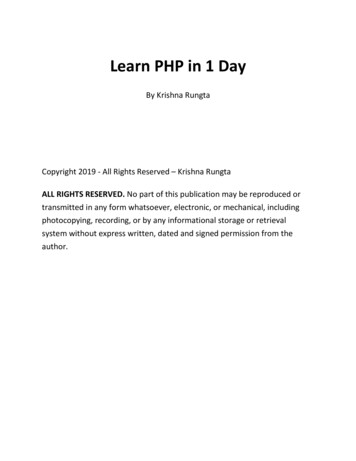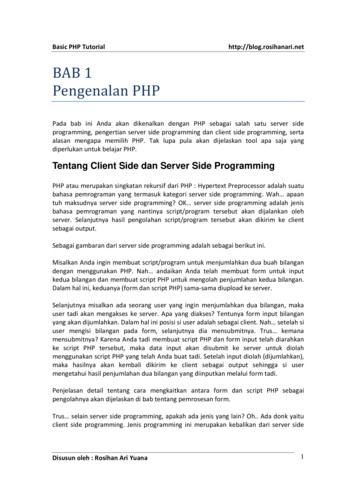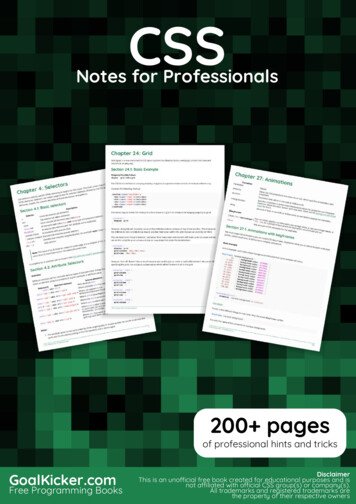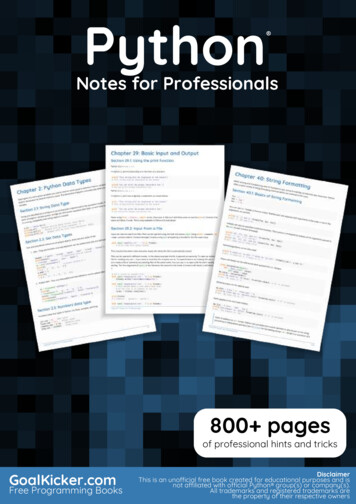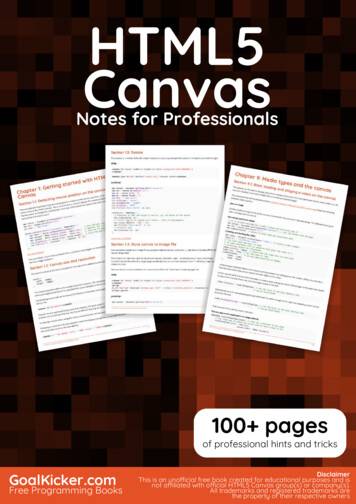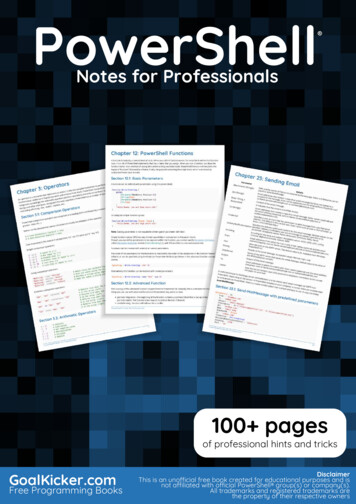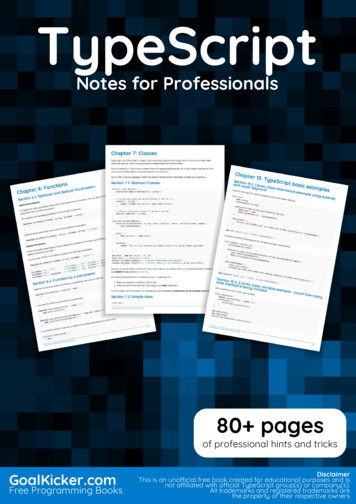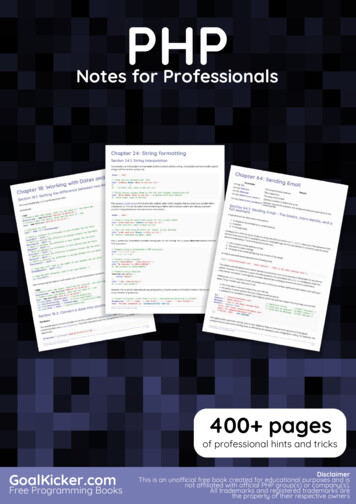
Transcription
PHPPHPNotes for ProfessionalsNotes for Professionals400 pagesof professional hints and tricksGoalKicker.comFree Programming BooksDisclaimerThis is an uno cial free book created for educational purposes and isnot a liated with o cial PHP group(s) or company(s).All trademarks and registered trademarks arethe property of their respective owners
ContentsAbout . 1Chapter 1: Getting started with PHP . 2Section 1.1: HTML output from web server . 2Section 1.2: Hello, World! . 3Section 1.3: Non-HTML output from web server . 3Section 1.4: PHP built-in server . 5Section 1.5: PHP CLI . 5Section 1.6: Instruction Separation . 6Section 1.7: PHP Tags . 7Chapter 2: Variables . 9Section 2.1: Accessing A Variable Dynamically By Name (Variable variables) . 9Section 2.2: Data Types . 10Section 2.3: Global variable best practices . 13Section 2.4: Default values of uninitialized variables . 14Section 2.5: Variable Value Truthiness and Identical Operator . 15Chapter 3: Variable Scope . 18Section 3.1: Superglobal variables . 18Section 3.2: Static properties and variables . 18Section 3.3: User-defined global variables . 19Chapter 4: Superglobal Variables PHP . 21Section 4.1: Suberglobals explained . 21Section 4.2: PHP5 SuperGlobals . 28Chapter 5: Outputting the Value of a Variable . 32Section 5.1: echo and print . 32Section 5.2: Outputting a structured view of arrays and objects . 33Section 5.3: String concatenation with echo . 35Section 5.4: printf vs sprintf . 36Section 5.5: Outputting large integers . 36Section 5.6: Output a Multidimensional Array with index and value and print into the table . 37Chapter 6: Constants . 39Section 6.1: Defining constants . 39Section 6.2: Class Constants . 40Section 6.3: Checking if constant is defined . 40Section 6.4: Using constants . 42Section 6.5: Constant arrays . 42Chapter 7: Magic Constants . 43Section 7.1: Di erence between FUNCTION and METHOD . 43Section 7.2: Di erence between CLASS , get class() and get called class() . 43Section 7.3: File & Directory Constants . 44Chapter 8: Comments . 45Section 8.1: Single Line Comments . 45Section 8.2: Multi Line Comments . 45Chapter 9: Types . 46Section 9.1: Type Comparison . 46Section 9.2: Boolean . 46Section 9.3: Float . 47
Section 9.4: Strings . 48Section 9.5: Callable . 50Section 9.6: Resources . 50Section 9.7: Type Casting . 51Section 9.8: Type Juggling . 51Section 9.9: Null . 52Section 9.10: Integers . 52Chapter 10: Operators . 54Section 10.1: Null Coalescing Operator (?) . 54Section 10.2: Spaceship Operator ( ) . 55Section 10.3: Execution Operator ( ) . 55Section 10.4: Incrementing ( ) and Decrementing Operators (--) . 55Section 10.5: Ternary Operator (?:) . 56Section 10.6: Logical Operators (&&/AND and /OR) . 57Section 10.7: String Operators (. and . ) . 57Section 10.8: Object and Class Operators . 57Section 10.9: Combined Assignment ( etc) . 59Section 10.10: Altering operator precedence (with parentheses) . 59Section 10.11: Basic Assignment ( ) . 60Section 10.12: Association . 60Section 10.13: Comparison Operators . 60Section 10.14: Bitwise Operators . 62Section 10.15: instanceof (type operator) . 64Chapter 11: References . 67Section 11.1: Assign by Reference . 67Section 11.2: Return by Reference . 67Section 11.3: Pass by Reference . 68Chapter 12: Arrays . 71Section 12.1: Initializing an Array . 71Section 12.2: Check if key exists . 73Section 12.3: Validating the array type . 74Section 12.4: Creating an array of variables . 74Section 12.5: Checking if a value exists in array . 74Section 12.6: ArrayAccess and Iterator Interfaces . 75Chapter 13: Array iteration . 79Section 13.1: Iterating multiple arrays together . 79Section 13.2: Using an incremental index . 80Section 13.3: Using internal array pointers . 80Section 13.4: Using foreach . 81Section 13.5: Using ArrayObject Iterator . 83Chapter 14: Executing Upon an Array . 84Section 14.1: Applying a function to each element of an array . 84Section 14.2: Split array into chunks . 85Section 14.3: Imploding an array into string . 86Section 14.4: "Destructuring" arrays using list() . 86Section 14.5: array reduce . 86Section 14.6: Push a Value on an Array . 87Chapter 15: Manipulating an Array . 89Section 15.1: Filtering an array . 89Section 15.2: Removing elements from an array . 90
Section 15.3: Sorting an Array . 91Section 15.4: Whitelist only some array keys . 96Section 15.5: Adding element to start of array . 96Section 15.6: Exchange values with keys . 97Section 15.7: Merge two arrays into one array . 97Chapter 16: Processing Multiple Arrays Together . 99Section 16.1: Array intersection . 99Section 16.2: Merge or concatenate arrays . 99Section 16.3: Changing a multidimensional array to associative array . 100Section 16.4: Combining two arrays (keys from one, values from another) . 100Chapter 17: Datetime Class . 102Section 17.1: Create Immutable version of DateTime from Mutable prior PHP 5.6 . 102Section 17.2: Add or Subtract Date Intervals . 102Section 17.3: getTimestamp . 102Section 17.4: setDate . 103Section 17.5: Create DateTime from custom format . 103Section 17.6: Printing DateTimes . 103Chapter 18: Working with Dates and Time . 105Section 18.1: Getting the di erence between two dates / times . 105Section 18.2: Convert a date into another format . 105Section 18.3: Parse English date descriptions into a Date format . 107Section 18.4: Using Predefined Constants for Date Format . 107Chapter 19: Control Structures . 109Section 19.1: if else . 109Section 19.2: Alternative syntax for control structures . 109Section 19.3: while . 109Section 19.4: do-while . 110Section 19.5: goto . 110Section 19.6: declare . 110Section 19.7: include & require . 111Section 19.8: return . 112Section 19.9: for . 112Section 19.10: foreach . 113Section 19.11: if elseif else . 113Section 19.12: if . 114Section 19.13: switch . 114Chapter 20: Loops . 116Section 20.1: continue . 116Section 20.2: break . 117Section 20.3: foreach . 118Section 20.4: do.while . 118Section 20.5: for . 119Section 20.6: while . 120Chapter 21: Functions . 121Section 21.1: Variable-length argument lists . 121Section 21.2: Optional Parameters . 122Section 21.3: Passing Arguments by Reference . 123Section 21.4: Basic Function Usage . 124Section 21.5: Function Scope . 124
Chapter 22: Functional Programming . 125Section 22.1: Closures . 125Section 22.2: Assignment to variables . 126Section 22.3: Objects as a function . 126Section 22.4: Using outside variables . 127Section 22.5: Anonymous function . 127Section 22.6: Pure functions . 128Section 22.7: Common functional methods in PHP . 128Section 22.8: Using built-in functions as callbacks . 129Section 22.9: Scope . 129Section 22.10: Passing a callback function as a parameter . 129Chapter 23: Alternative Syntax for Control Structures . 131Section 23.1: Alternative if/else statement . 131Section 23.2: Alternative for statement . 131Section 23.3: Alternative while statement . 131Section 23.4: Alternative foreach statement . 131Section 23.5: Alternative switch statement . 132Chapter 24: String formatting . 133Section 24.1: String interpolation . 133Section 24.2: Extracting/replacing substrings . 134Chapter 25: String Parsing . 136Section 25.1: Splitting a string by separators . 136Section 25.2: Substring . 136Section 25.3: Searching a substring with strpos . 138Section 25.4: Parsing string using regular expressions . 139Chapter 26: Classes and Objects . 140Section 26.1: Class Constants . 140Section 26.2: Abstract Classes . 142Section 26.3: Late static binding . 144Section 26.4: Namespacing and Autoloading . 145Section 26.5: Method and Property Visibility . 147Section 26.6: Interfaces . 149Section 26.7: Final Keyword . 152Section 26.8: Autoloading . 153Section 26.9: Calling a parent constructor when instantiating a child . 154Section 26.10: Dynamic Binding . 155Section 26.11: this, self and static plus the singleton . 156Section 26.12: Defining a Basic Class . 159Section 26.13: Anonymous Classes . 160Chapter 27: Namespaces . 162Section 27.1: Declaring namespaces .
PHP PHP Notes for Professionals Notes for Professionals GoalKicker.com Free Programming Books Disclaimer This is an uno cial free book created for educational purposes and is not a liated with o cial PHP group(s) or company(s). All trademarks and registered trademarks are the property of the
